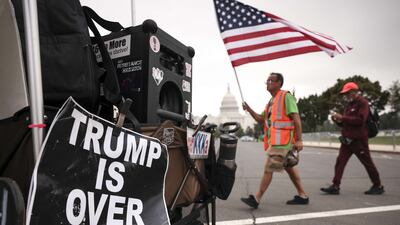Actions have consequences. Words have consequences. As do silences, especially in crucial times, when they emanate from the seat of great power, like that of a US president.
On January 6 last year, the world watched a formidable symbol of American democracy be desecrated by an angry mob, supportive of Donald Trump, that was incited by the words of the former US president, to "take back control" and "stop the steal".
The mob was encouraged by Mr Trump, first, by his words and actions – the phone calls to rustle up 11,780 votes – and then by his long uncharacteristic silence, his too conspicuous delay in calling for calm and telling protesters to go home, yet insisting “this was a fraudulent election".
There were other inciting slogans that pushed hordes of Trump supporters to break the law, scaling the gates of the US Capitol, storming the premises, and causing immeasurable damage to the psyche and conscience of rational people across America.
If they had wanted, Trump supporters could have demonstrated differently. They had every right to peaceful protest. But the violence that left five people dead, including a Capitol police officer, can never be condoned, not under any guise of freedom or civil liberties.
The unwillingness of a large mass of people to accept the result of a democratic and secure election process indicates a deep and dangerous malaise in American society. This is only exacerbated by country-wide misinformation campaigns, online or elsewhere.
America is "in very dangerous territory", Barbara F Walter, author of a book (out this month) called How Civil Wars Start, and a professor of political science at the University of California, who serves on a CIA advisory panel, has warned. But not believing facts is not just an American problem.
The consequences of subscribing to misinformation are at the root of several dire problems in the world today. And it is not just that democracies are imperilled; actual lives are at stake. The pandemic has shone a light on what is no longer a fringe section of people. Over the past 18 months, anti-vaxxers have made their presence felt all over the world.
As with the group of people who believe falsehoods over facts – such as the baseless belief that an election was stolen – anti-vaxxers discredit science and data and replace it with their own contorted understanding of reality. They have never been more of a menace.
America recorded one million Covid-19 cases in a single day this week with 35 million unvaccinated Americans. This is not an underdeveloped country with a modest GDP. For a country usually portrayed as a beacon of progress, and where vaccines are made abundant, it is astonishing that so many people continue to make a choice to not be inoculated against the virus; and consequently to not be safe and to not keep others safe, presumably because they are convinced that their own misinformed assumptions of science are the truth. This situation is far from under control.
Fortunately, social media companies have gradually begun to take more proactive positions. If January 6 is one year of the US Capitol violence, January 9 is a year since Twitter permanently banned Mr Trump for violating the company's terms. And just this week, for fuelling misinformation, Twitter also permanently banned Republican Congresswoman Marjorie Taylor Greene. For similar reasons, in September last year, Facebook banned 150 German Facebook accounts and expanding its medical misinformation policies, YouTube removed 130,000 videos perpetuating wrong information about vaccines.
Combating misinformation is an enormous challenge. To tackle it is an arduous process but one that must be joined so that societies function and remain stable. It starts with people, institutions and all stakeholders, public and private, no longer staying silent.


